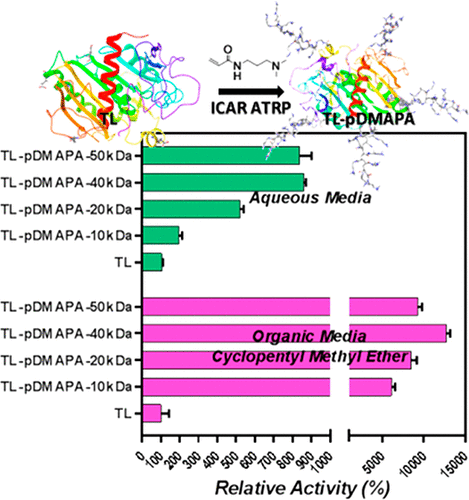当前位置:
X-MOL 学术
›
Bioconjugate Chem.
›
论文详情
Our official English website, www.x-mol.net, welcomes your feedback! (Note: you will need to create a separate account there.)
Toward Next-Generation Biohybrid Catalyst Design: Influence of Degree of Polymerization on Enzyme Activity.
Bioconjugate Chemistry ( IF 4.7 ) Pub Date : 2020-03-02 , DOI: 10.1021/acs.bioconjchem.0c00084 Marina Kovaliov 1 , Thaiesha A Wright 2 , Boyle Cheng 1 , Robert T Mathers 3 , Xiangyu Zhang 4 , Dong Meng 4 , Katarzyna Szcześniak 5, 6 , Jacek Jenczyk 5 , Stefan Jurga 5 , Devora Cohen-Karni 7 , Richard C Page 2 , Dominik Konkolewicz 2 , Saadyah Averick 1
Bioconjugate Chemistry ( IF 4.7 ) Pub Date : 2020-03-02 , DOI: 10.1021/acs.bioconjchem.0c00084 Marina Kovaliov 1 , Thaiesha A Wright 2 , Boyle Cheng 1 , Robert T Mathers 3 , Xiangyu Zhang 4 , Dong Meng 4 , Katarzyna Szcześniak 5, 6 , Jacek Jenczyk 5 , Stefan Jurga 5 , Devora Cohen-Karni 7 , Richard C Page 2 , Dominik Konkolewicz 2 , Saadyah Averick 1
Affiliation

|
Due to their capacity to conduct complex organic transformations, enzymes find extensive use in medical and industrial settings. Unfortunately, enzymes are limited by their poor stability when exposed to harsh non-native conditions. While a host of methods have been developed to stabilize enzymes in non-native conditions, recent research into the synthesis of polymer-enzyme biohybrids using reversible deactivation radical polymerization approaches has demonstrated the potential of increased enzymatic activity in both native and non-native environments. In this manuscript, we utilize the enzyme lipase, as a model system, to explore the impact that modulation of grafted polymer molecular weight has on enzyme activity in both aqueous and organic media. We studied the properties of these hybrids using both solution-phase enzyme activity methods and coarse-grain modeling to assess the impact of polymer grafting density and grafted polymer molecular weight on enzyme activity to gain a deeper insight into this understudied property of the biohybrid system.
中文翻译:

迈向下一代生物杂化催化剂设计:聚合度对酶活性的影响。
由于其进行复杂有机转化的能力,酶在医学和工业环境中得到了广泛的应用。不幸的是,当暴露于恶劣的非天然条件下时,酶的稳定性受到限制。虽然已经开发出许多方法来稳定酶在非天然条件下的稳定性,但是最近对使用可逆失活自由基聚合方法合成聚合物酶生物杂交体的研究表明,在天然和非天然环境中提高酶活性的潜力。在本手稿中,我们利用酶脂肪酶作为模型系统,探讨了在水和有机介质中调节接枝聚合物分子量对酶活性的影响。
更新日期:2020-03-03
中文翻译:

迈向下一代生物杂化催化剂设计:聚合度对酶活性的影响。
由于其进行复杂有机转化的能力,酶在医学和工业环境中得到了广泛的应用。不幸的是,当暴露于恶劣的非天然条件下时,酶的稳定性受到限制。虽然已经开发出许多方法来稳定酶在非天然条件下的稳定性,但是最近对使用可逆失活自由基聚合方法合成聚合物酶生物杂交体的研究表明,在天然和非天然环境中提高酶活性的潜力。在本手稿中,我们利用酶脂肪酶作为模型系统,探讨了在水和有机介质中调节接枝聚合物分子量对酶活性的影响。


























 京公网安备 11010802027423号
京公网安备 11010802027423号